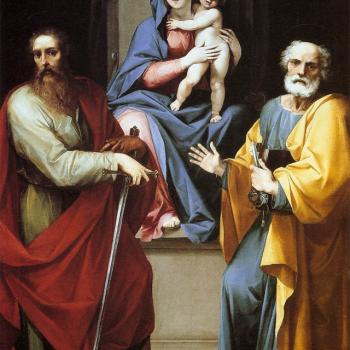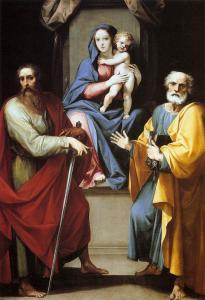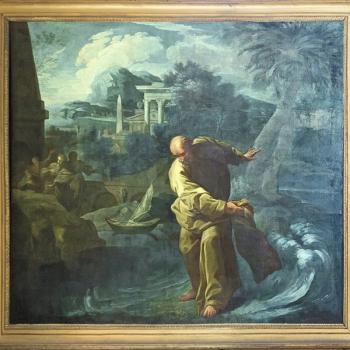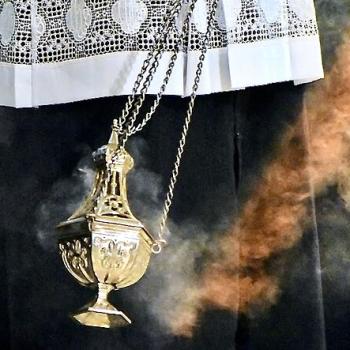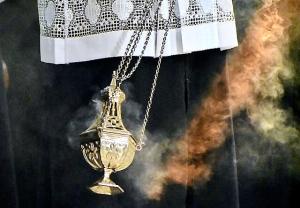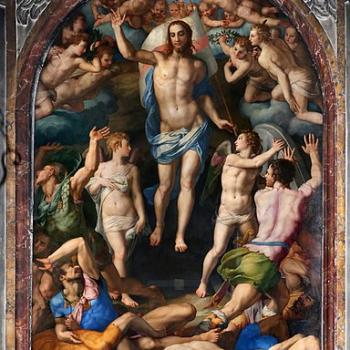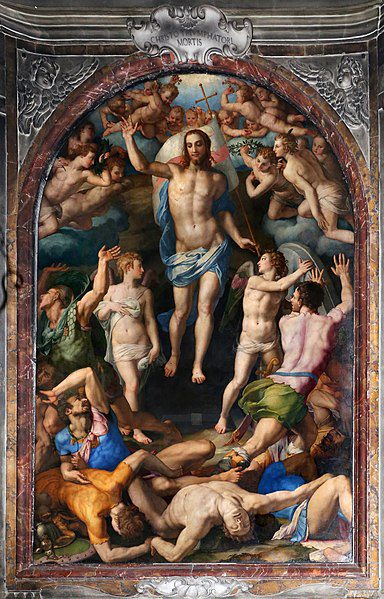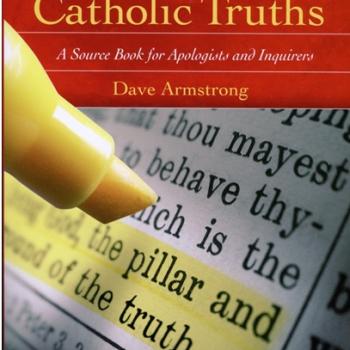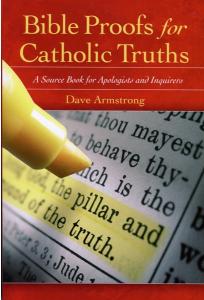“VAIN REPETITION” CHARGE (MASS, ROSARY, ETC.) / FORMAL, “LITURGICAL” WORSHIP
Psalm 136:1-5 O give thanks to the LORD, for he is good, for his steadfast love endures for ever. [2] O give thanks to the God of gods, for his steadfast love endures for ever. [3] O give thanks to the Lord of lords, for his steadfast love endures for ever; [4] to him who alone does great wonders, for his steadfast love endures for ever; [5] to him who by understanding made the heavens, for his steadfast love endures for ever;
The same exact phrase is repeated in 26 straight verses, for the entire Psalm. Obviously, then, God is not opposed to all repetition whatsoever. Repetition is a device used throughout the Psalms and also in Proverbs and the prophets. For example, in Psalm 29 “voice of the Lord” is repeated seven times in as many verses. “Thou hast” is repeated in six straight verses in Psalm 44:9-14.
Instructions concerning the Mosaic Law in the first five books are extremely repetitious. Elaborate, painstaking Instructions for the ark of the covenant (Ex 25:1-22), the tabernacle (Ex 25:23-40; chapters 26-27), and the Temple (1 Kings, chapters 6-7) illustrate the highly ritualistic nature of Hebrew worship (see also Leviticus 23:37-38 and 24:5-8). The four gospels often repeat each other’s sayings. Many other examples could be cited.
Matthew 6:7 And in praying do not heap up empty phrases [KJV: “vain repetitions”] as the Gentiles do; for they think that they will be heard for their many words.
Jesus is discussing “empty phrases”. The Greek battalogeo here means “to repeat idly,” or “meaningless and mechanically repeated phrases.” So the Lord is condemning prayers uttered without the proper reverence or respect for God.
Revelation 4:8 And the four living creatures, each of them with six wings, are full of eyes all round and within, and day and night they never cease to sing, “Holy, holy, holy, is the Lord God Almighty, who was and is and is to come!”
God is concerned with the inner dispositions and righteousness of the worshiper, and adherence to His commands (e.g., Is 56:6-7; Jer 17:24-26; Mal 1:11), not with outward appearance or how often something is repeated (which is contradicted by Psalm 136 and the passage above). This is a common theme in Scripture, and is seen in the following passages:
Isaiah 1:13-17 Bring no more vain offerings; incense is an abomination to me. New moon and sabbath and the calling of assemblies — I cannot endure iniquity and solemn assembly. Your new moons and your appointed feasts my soul hates; they have become a burden to me, I am weary of bearing them. When you spread forth your hands, I will hide my eyes from you; even though you make many prayers, I will not listen; your hands are full of blood. Wash yourselves; make yourselves clean; remove the evil of your doings from before my eyes; cease to do evil, learn to do good; seek justice, correct oppression; defend the fatherless, plead for the widow.
Jeremiah 6:19-20 Hear, O earth; behold, I am bringing evil upon this people, the fruit of their devices, because they have not given heed to my words; and as for my law, they have rejected it. To what purpose does frankincense come to me from Sheba, or sweet cane from a distant land? Your burnt offerings are not acceptable, nor your sacrifices pleasing to me.
Amos 5:11-14, 21-24: Therefore because you trample upon the poor and take from him exactions of wheat, you have built houses of hewn stone, but you shall not dwell in them; you have planted pleasant vineyards, but you shall not drink their wine. For I know how many are your transgressions, and how great are your sins — you who afflict the righteous, who take a bribe, and turn aside the needy in the gate. Therefore he who is prudent will keep silent in such a time; for it is an evil time. Seek good, and not evil, that you may live; and so the LORD, the God of hosts, will be with you, as you have said . . . I hate, I despise your feasts, and I take no delight in your solemn assemblies. Even though you offer me your burnt offerings and cereal offerings, I will not accept them, and the peace offerings of your fatted beasts I will not look upon. Take away from me the noise of your songs; to the melody of your harps I will not listen. But let justice roll down like waters, and righteousness like an ever-flowing stream. (cf. Prov 15:8; 21:27; Mal 1:6-14)
Matthew 15:7-9 You hypocrites! Well did Isaiah prophesy of you, when he said: “This people honors me with their lips, but their heart is far from me; in vain do they worship me, teaching as doctrines the precepts of men.” (cf. Mk 7:6-7)
Matthew 23:23 Woe to you, scribes and Pharisees, hypocrites! for you tithe mint and dill and cummin, and have neglected the weightier matters of the law, justice and mercy and faith; these you ought to have done, without neglecting the others.
James 1:26-27: If any one thinks he is religious, and does not bridle his tongue but deceives his heart, this man’s religion is vain. Religion that is pure and undefiled before God and the Father is this: to visit orphans and widows in their affliction, and to keep oneself unstained from the world.
Ritualistic, formal worship of God is described as taking place in heaven (Rev 4:8-11; 5:8-14), complete with repetitious prayer (Rev 4:8 above), and repeated chants or hymns (4:11, 5:9-10).
HOLY WATER
Exodus 23:25 You shall serve the LORD your God, and I will bless your bread and your water; and I will take sickness away from the midst of you.
Numbers 5:17 and the priest shall take holy water in an earthen vessel, and take some of the dust that is on the floor of the tabernacle and put it into the water.
Numbers 19:9, 13-20 And a man who is clean shall gather up the ashes of the heifer, and deposit them outside the camp in a clean place; and they shall be kept for the congregation of the people of Israel for the water for impurity, for the removal of sin. . . . Whoever touches a dead person, the body of any man who has died, and does not cleanse himself, defiles the tabernacle of the LORD, and that person shall be cut off from Israel; because the water for impurity was not thrown upon him, he shall be unclean; his uncleanness is still on him. This is the law when a man dies in a tent: every one who comes into the tent, and every one who is in the tent, shall be unclean seven days. And every open vessel, which has no cover fastened upon it, is unclean. . . . Whoever in the open field touches one who is slain with a sword, or a dead body, or a bone of a man, or a grave, shall be unclean seven days. For the unclean they shall take some ashes of the burnt sin offering, and running water shall be added in a vessel; then a clean person shall take hyssop, and dip it in the water, and sprinkle it upon the tent, and upon all the furnishings, and upon the persons who were there, and upon him who touched the bone, or the slain, or the dead, or the grave; and the clean person shall sprinkle upon the unclean on the third day and on the seventh day; thus on the seventh day he shall cleanse him, and he shall wash his clothes and bathe himself in water, and at evening he shall be clean. But the man who is unclean and does not cleanse himself, that person shall be cut off from the midst of the assembly, since he has defiled the sanctuary of the LORD; because the water for impurity has not been thrown upon him, he is unclean.
2 Kings 2:19-22 Now the men of the city said to Eli’sha, “Behold, the situation of this city is pleasant, as my lord sees; but the water is bad, and the land is unfruitful.” He said, “Bring me a new bowl, and put salt in it.” So they brought it to him.
Then he went to the spring of water and threw salt in it, and said, “Thus says the LORD, I have made this water wholesome; henceforth neither death nor miscarriage shall come from it.” So the water has been wholesome to this day, according to the word which Eli’sha spoke.
2 Kings 5:13-14 But his servants came near and said to him, “My father, if the prophet had commanded you to do some great thing, would you not have done it? How much rather, then, when he says to you, ‘Wash, and be clean’?” So he went down and dipped himself seven times in the Jordan, according to the word of the man of God; and his flesh was restored like the flesh of a little child, and he was clean.
John 9:6-7 As he said this, he spat on the ground and made clay of the spittle and anointed the man’s eyes with the clay, saying to him, “Go, wash in the pool of Silo’am” (which means Sent). So he went and washed and came back seeing.
Water in Scripture is utilized for cleansing (Lev 14:8-9, 50-52; 15:5-27; 17:15; Num 8:7; 19:12, 18-19; 2 Ki 5:12; Ps 51:7; Ezek 16:4; 36:25) and purifying (Ex 29:4; 40:12, 30-32; Lev 11:32; 16:4, 24, 26, 28; 22:6; Num 19:7-8; 31:23; Deut 23:10-11; 1 Ki 18:33-34; Jn 2:6; Heb 9:19).
CANDLES AND INCENSE
Incense or burning sacrifices, as an image of prayer or offering, along with the metaphorical smelling of the offering by God, is a common biblical motif:
Genesis 8:20-21 Then Noah built an altar to the LORD, and took of every clean animal and of every clean bird, and offered burnt offerings on the altar. And when the LORD smelled the pleasing odor, the LORD said in his heart, “I will never again curse the ground because of man, for the imagination of man’s heart is evil from his youth; neither will I ever again destroy every living creature as I have done.”
Leviticus 2:9 And the priest shall take from the cereal offering its memorial portion and burn this on the altar, an offering by fire, a pleasing odor to the LORD.
Leviticus 6:15, 21 And one shall take from it a handful of the fine flour of the cereal offering with its oil and all the frankincense which is on the cereal offering, and burn this as its memorial portion on the altar, a pleasing odor to the LORD. . . . It shall be made with oil on a griddle; you shall bring it well mixed, in baked pieces like a cereal offering, and offer it for a pleasing odor to the LORD.
Psalm 141:2 Let my prayer be counted as incense before thee, and the lifting up of my hands as an evening sacrifice!
Luke 1:9-10 according to the custom of the priesthood, it fell to him by lot to enter the temple of the Lord and burn incense. And the whole multitude of the people were praying outside at the hour of incense.
Revelation 5:8 And when he had taken the scroll, the four living creatures and the twenty-four elders fell down before the Lamb, each holding a harp, and with golden bowls full of incense, which are the prayers of the saints;
Revelation 8:3-4 And another angel came and stood at the altar with a golden censer; and he was given much incense to mingle with the prayers of all the saints upon the golden altar before the throne; and the smoke of the incense rose with the prayers of the saints from the hand of the angel before God.
The Bible even uses the symbolism of fragrance for the gospel, Jesus’ redemptive sacrifice on the cross, and charitable giving:
2 Corinthians 2:14 But thanks be to God, who in Christ always leads us in triumph, and through us spreads the fragrance of the knowledge of him everywhere.
Ephesians 5:2 And walk in love, as Christ loved us and gave himself up for us, a fragrant offering and sacrifice to God.
Philippians 4:18 I have received full payment, and more; I am filled, having received from Epaphrodi’tus the gifts you sent, a fragrant offering, a sacrifice acceptable and pleasing to God.
Explicit evidence for candles in the Bible is seen in the form of “lamps”. The classic form of this is the menorah, or seven-branched lampstand, which has often been used as a symbol of Judaism. The King James Bible often uses candle or candlestick in these passages and others (as did the American Standard Version of 1901). But the Greek lychnos and lychnia describe (technically) oil lamps, not candles per se (made of wax: as we know them today). These were containers filled with olive oil, with a wick of flax or hemp.
Exodus 25:31-38 And you shall make a lampstand of pure gold. The base and the shaft of the lampstand shall be made of hammered work; its cups, its capitals, and its flowers shall be of one piece with it; and there shall be six branches going out of its sides, three branches of the lampstand out of one side of it and three branches of the lampstand out of the other side of it; three cups made like almonds, each with capital and flower, on one branch, and three cups made like almonds, each with capital and flower, on the other branch — so for the six branches going out of the lampstand; and on the lampstand itself four cups made like almonds, with their capitals and flowers, and a capital of one piece with it under each pair of the six branches going out from the lampstand. Their capitals and their branches shall be of one piece with it, the whole of it one piece of hammered work of pure gold. And you shall make the seven lamps for it; and the lamps shall be set up so as to give light upon the space in front of it. Its snuffers and their trays shall be of pure gold. (cf. 26:35; Num 3:31; 4:9; 8:2-4; 1 Sam 3:3; 1 Ki 7:49; 1 Chron 28:15; 2 Chron 4:7,20-21; Jer 52:19; Zech 4:2, 11)
Exodus 27:19-20 All the utensils of the tabernacle for every use, and all its pegs and all the pegs of the court, shall be of bronze. And you shall command the people of Israel that they bring to you pure beaten olive oil for the light, that a lamp may be set up to burn continually. (cf. Lev 24:2-4)
Exodus 30:7-8 And Aaron shall burn fragrant incense on it; every morning when he dresses the lamps he shall burn it, and when Aaron sets up the lamps in the evening, he shall burn it, a perpetual incense before the LORD throughout your generations. (cf. 30:27; 31:8; 35:14; 37:17-23; 39:37; 40:4)
Exodus 40:24-25 And he put the lampstand in the tent of meeting, opposite the table on the south side of the tabernacle, and set up the lamps before the LORD; as the LORD had commanded Moses.
2 Chronicles 13:11 They offer to the LORD every morning and every evening burnt offerings and incense of sweet spices, set out the showbread on the table of pure gold, and care for the golden lampstand that its lamps may burn every evening; for we keep the charge of the LORD our God, but you have forsaken him.
2 Chronicles 29:7 They also shut the doors of the vestibule and put out the lamps, and have not burned incense or offered burnt offerings in the holy place to the God of Israel.
1 Maccabees 4:49-50 They made new holy vessels, and brought the lampstand, the altar of incense, and the table into the temple. Then they burned incense on the altar and lighted the lamps on the lampstand, and these gave light in the temple.
2 Maccabees 10:3 They purified the sanctuary, and made another altar of sacrifice; then, striking fire out of flint, they offered sacrifices, after a lapse of two years, and they burned incense and lighted lamps and set out the bread of the Presence.
Hebrews 9:2 For a tent was prepared, the outer one, in which were the lampstand and the table and the bread of the Presence; it is called the Holy Place.
Revelation 1:12-13, 20 Then I turned to see the voice that was speaking to me, and on turning I saw seven golden lampstands, and in the midst of the lampstands one like a son of man, clothed with a long robe and with a golden girdle round his breast; . . . As for the mystery of the seven stars which you saw in my right hand, and the seven golden lampstands, the seven stars are the angels of the seven churches and the seven lampstands are the seven churches.
Revelation 2:1, 5 To the angel of the church in Ephesus write: “The words of him who holds the seven stars in his right hand, who walks among the seven golden lampstands. . . . Remember then from what you have fallen, repent and do the works you did at first. If not, I will come to you and remove your lampstand from its place, unless you repent.”
Revelation 4:5 From the throne issue flashes of lightning, and voices and peals of thunder, and before the throne burn seven torches of fire, which are the seven spirits of God;
FASTING AND ABSTINENCE AND LENT (50 PASSAGES)
Exodus 24:18 And Moses entered the cloud, and went up on the mountain. And Moses was on the mountain forty days and forty nights.
Exodus 34:28 And he was there with the LORD forty days and forty nights; he neither ate bread nor drank water. And he wrote upon the tables the words of the covenant, the ten commandments.
Leviticus 10:9 Drink no wine nor strong drink, you nor your sons with you, when you go into the tent of meeting, lest you die; it shall be a statute for ever throughout your generations.
Numbers 6:1-4 And the LORD said to Moses, “Say to the people of Israel, When either a man or a woman makes a special vow, the vow of a Nazirite, to separate himself to the LORD, he shall separate himself from wine and strong drink; he shall drink no vinegar made from wine or strong drink, and shall not drink any juice of grapes or eat grapes, fresh or dried. All the days of his separation he shall eat nothing that is produced by the grapevine, not even the seeds or the skins.”
Deuteronomy 9:9 When I went up the mountain to receive the tables of stone, the tables of the covenant which the LORD made with you, I remained on the mountain forty days and forty nights; I neither ate bread nor drank water.
Deuteronomy 9:25 So I lay prostrate before the LORD for these forty days and forty nights, because the LORD had said he would destroy you.
Deuteronomy 29:5-6 I have led you forty years in the wilderness; your clothes have not worn out upon you, and your sandals have not worn off your feet; you have not eaten bread, and you have not drunk wine or strong drink; that you may know that I am the LORD your God.
Judges 13:3-5 And the angel of the LORD appeared to the woman and said to her, “Behold, you are barren and have no children; but you shall conceive and bear a son [Samson]. Therefore beware, and drink no wine or strong drink, and eat nothing unclean, for lo, you shall conceive and bear a son. No razor shall come upon his head, for the boy shall be a Nazirite to God from birth; and he shall begin to deliver Israel from the hand of the Philistines.” (cf. 13:14)
1 Samuel 1:15 But Hannah answered, “No, my lord, I am a woman sorely troubled; I have drunk neither wine nor strong drink, but I have been pouring out my soul before the LORD.
1 Samuel 31:13 And they took their bones and buried them under the tamarisk tree in Jabesh, and fasted seven days.
2 Samuel 1:12 and they mourned and wept and fasted until evening for Saul and for Jonathan his son and for the people of the LORD and for the house of Israel, because they had fallen by the sword.
2 Samuel 12:16 David therefore besought God for the child; and David fasted, and went in and lay all night upon the ground. (cf. 12:21-23)
1 Kings 19:8 And he [Elijah] arose, and ate and drank, and went in the strength of that food forty days and forty nights to Horeb the mount of God.
1 Chronicles 10:12 And they buried their bones under the oak in Jabesh, and fasted seven days.
2 Chronicles 20:3 Then Jehosh’aphat feared, and set himself to seek the LORD, and proclaimed a fast throughout all Judah.
Ezra 8:21, 23 Then I proclaimed a fast there, at the river Aha’va, that we might humble ourselves before our God, to seek from him a straight way for ourselves, our children, and all our goods. . . . So we fasted and besought our God for this, and he listened to our entreaty. (cf. 9:5)
Nehemiah 1:4 When I heard these words I sat down and wept, and mourned for days; and I continued fasting and praying before the God of heaven.
Nehemiah 9:1 Now on the twenty-fourth day of this month the people of Israel were assembled with fasting and in sackcloth, and with earth upon their heads.
Esther 4:3 And in every province, wherever the king’s command and his decree came, there was great mourning among the Jews, with fasting and weeping and lamenting, and most of them lay in sackcloth and ashes.
Esther 4:16 Go, gather all the Jews to be found in Susa, and hold a fast on my behalf, and neither eat nor drink for three days, night or day. I and my maids will also fast as you do. Then I will go to the king, though it is against the law; and if I perish, I perish.
Esther 9:31 that these days of Purim should be observed at their appointed seasons, as Mor’decai the Jew and Queen Esther enjoined upon the Jews, and as they had laid down for themselves and for their descendants, with regard to their fasts and their lamenting.
Psalm 35:13 But I, when they were sick — I wore sackcloth, I afflicted myself with fasting. I prayed with head bowed on my bosom,
Psalm 69:10 . . . I humbled my soul with fasting, . . .
Psalm 109:24 My knees are weak through fasting; my body has become gaunt.
Jeremiah 36:9 In the fifth year of Jehoi’akim the son of Josi’ah, king of Judah, in the ninth month, all the people in Jerusalem and all the people who came from the cities of Judah to Jerusalem proclaimed a fast before the LORD.
Ezekiel 4:4-12 Then lie upon your left side, and I will lay the punishment of the house of Israel upon you; for the number of the days that you lie upon it, you shall bear their punishment. For I assign to you a number of days, three hundred and ninety days, equal to the number of the years of their punishment; so long shall you bear the punishment of the house of Israel. And when you have completed these, you shall lie down a second time, but on your right side, and bear the punishment of the house of Judah; forty days I assign you, a day for each year. And you shall set your face toward the siege of Jerusalem, with your arm bared; and you shall prophesy against the city. And, behold, I will put cords upon you, so that you cannot turn from one side to the other, till you have completed the days of your siege. And you, take wheat and barley, beans and lentils, millet and spelt, and put them into a single vessel, and make bread of them. During the number of days that you lie upon your side, three hundred and ninety days, you shall eat it. And the food which you eat shall be by weight, twenty shekels a day; once a day you shall eat it. And water you shall drink by measure, the sixth part of a hin; once a day you shall drink. And you shall eat it as a barley cake, baking it in their sight on human dung.
Daniel 6:18 Then the king went to his palace, and spent the night fasting; no diversions were brought to him, and sleep fled from him.
Daniel 9:3 Then I turned my face to the Lord God, seeking him by prayer and supplications with fasting and sackcloth and ashes.
Joel 1:14 Sanctify a fast, call a solemn assembly. . . . (cf. 2:15)
Joel 2:12 “Yet even now,” says the LORD, “return to me with all your heart, with fasting, with weeping, and with mourning;”
Jonah 3:5 And the people of Nin’eveh believed God; they proclaimed a fast, and put on sackcloth, from the greatest of them to the least of them.
Zechariah 8:19 Thus says the LORD of hosts: The fast of the fourth month, and the fast of the fifth, and the fast of the seventh, and the fast of the tenth, shall be to the house of Judah seasons of joy and gladness, and cheerful feasts; therefore love truth and peace. (cf. 7:3, 5)
Tobit 12:8 Prayer is good when accompanied by fasting, almsgiving, and righteousness. A little with righteousness is better than much with wrongdoing. It is better to give alms than to treasure up gold.
Judith 4:9, 13 And every man of Israel cried out to God with great fervor, and they humbled themselves with much fasting. . . . So the Lord heard their prayers and looked upon their affliction; for the people fasted many days throughout Judea and in Jerusalem before the sanctuary of the Lord Almighty.
Judith 8:6 She fasted all the days of her widowhood, except the day before the sabbath and the sabbath itself, the day before the new moon and the day of the new moon, and the feasts and days of rejoicing of the house of Israel.
Sirach 34:26 So if a man fasts for his sins, and goes again and does the same things, who will listen to his prayer? And what has he gained by humbling himself?
2 Maccabees 13:12 . . . they . . . besought the merciful Lord with weeping and fasting and lying prostrate for three days without ceasing,. . . (cf, 1 Macc 3:47; Baruch 1:5)
Matthew 4:2 And he [Jesus] fasted forty days and forty nights, and afterward he was hungry.
Matthew 6:16-18 And when you fast, do not look dismal, like the hypocrites, for they disfigure their faces that their fasting may be seen by men. Truly, I say to you, they have received their reward. But when you fast, anoint your head and wash your face, that your fasting may not be seen by men but by your Father who is in secret; and your Father who sees in secret will reward you.
Matthew 9:14-15 Then the disciples of John came to him, saying, “Why do we and the Pharisees fast, but your disciples do not fast?” And Jesus said to them, “Can the wedding guests mourn as long as the bridegroom is with them? The days will come, when the bridegroom is taken away from them, and then they will fast.” (cf. Mk 2:18-20; Lk 5:33-35; 18:12)
Luke 2:37 . . . She did not depart from the temple, worshiping with fasting and prayer night and day.
Luke 7:33 For John the Baptist has come eating no bread and drinking no wine; and you say, “He has a demon.” (cf. Mt 11:18; Lk 1:15)
Acts 13:2-3 While they were worshiping the Lord and fasting, the Holy Spirit said, “Set apart for me Barnabas and Saul for the work to which I have called them.” Then after fasting and praying they laid their hands on them and sent them off.
Acts 14:23 And when they had appointed elders for them in every church, with prayer and fasting they committed them to the Lord in whom they believed.
Acts 15:20 . . . abstain from the pollutions of idols and from unchastity and from what is strangled and from blood.
Acts 15:29 . . . abstain from what has been sacrificed to idols and from blood and from what is strangled and from unchastity. . . . (cf. 21:25)
Romans 14:3 Let not him who eats despise him who abstains, and let not him who abstains pass judgment on him who eats; for God has welcomed him.
Romans 14:6 He who observes the day, observes it in honor of the Lord. He also who eats, eats in honor of the Lord, since he gives thanks to God; while he who abstains, abstains in honor of the Lord and gives thanks to God.
Romans 14:15, 21 If your brother is being injured by what you eat, you are no longer walking in love. Do not let what you eat cause the ruin of one for whom Christ died. . . . it is right not to eat meat or drink wine or do anything that makes your brother stumble.
1 Corinthians 8:13 Therefore, if food is a cause of my brother’s falling, I will never eat meat, lest I cause my brother to fall. (cf. 2 Cor 6:4-5; 11:27)
The forty days of Lenten observance have several forty day parallels in Scripture (all listed above): Moses’ fasts on the the holy mountain (Ex 24:18; 34:28; Deut 9:9) and his intercession for Israel (Deut 9:25), Elijah’s journey to Mt. Horeb (1 Ki 19:8), Ezekiel’s lying on one side (Ezek 4:6), and Christ’s fast in the wilderness (Mt 4:2).
ASHES ON ASH WEDNESDAY
Genesis 2:7 then the LORD God formed man of dust from the ground, and breathed into his nostrils the breath of life; and man became a living being.
Genesis 3:19 In the sweat of your face you shall eat bread till you return to the ground, for out of it you were taken; you are dust, and to dust you shall return.
Genesis 18:27 Abraham answered, “Behold, I have taken upon myself to speak to the Lord, I who am but dust and ashes.”
2 Samuel 13:19 And Tamar put ashes on her head, and rent the long robe which she wore; and she laid her hand on her head, and went away, crying aloud as she went.
Nehemiah 9:1 Now on the twenty-fourth day of this month the people of Israel were assembled with fasting and in sackcloth, and with earth upon their heads.
Esther 4:1, 3 When Mor’decai learned all that had been done, Mor’decai rent his clothes and put on sackcloth and ashes, and went out into the midst of the city, wailing with a loud and bitter cry; . . . And in every province, wherever the king’s command and his decree came, there was great mourning among the Jews, with fasting and weeping and lamenting, and most of them lay in sackcloth and ashes.
Job 2:8 And he took a potsherd with which to scrape himself, and sat among the ashes.
Job 34:15 all flesh would perish together, and man would return to dust.
Job 42:6 therefore I despise myself, and repent in dust and ashes.
Psalm 90:3 Thou turnest man back to the dust, . . .
Isaiah 58:5 Is such the fast that I choose, a day for a man to humble himself? Is it to bow down his head like a rush, and to spread sackcloth and ashes under him? Will you call this a fast, and a day acceptable to the LORD?
Jeremiah 6:26 O daughter of my people, gird on sackcloth, and roll in ashes; make mourning as for an only son, most bitter lamentation; for suddenly the destroyer will come upon us.
Jeremiah 25:34 Wail, you shepherds, and cry, and roll in ashes, . . .
Ezekiel 27:30 and wail aloud over you, and cry bitterly. They cast dust on their heads and wallow in ashes;
Daniel 9:3 Then I turned my face to the Lord God, seeking him by prayer and supplications with fasting and sackcloth and ashes.
Jonah 3:6 Then tidings reached the king of Nin’eveh, and he arose from his throne, removed his robe, and covered himself with sackcloth, and sat in ashes.
Judith 4:11, 15 And all the men and women of Israel, and their children, living at Jerusalem, prostrated themselves before the temple and put ashes on their heads and spread out their sackcloth before the Lord. . . . With ashes upon their turbans, they cried out to the Lord with all their might to look with favor upon the whole house of Israel.
Sirach 17:32 He marshals the host of the height of heaven; but all men are dust and ashes.
Sirach 40:3 from the man who sits on a splendid throne to the one who is humbled in dust and ashes,
1 Maccabees 3:47 They fasted that day, put on sackcloth and sprinkled ashes on their heads, and rent their clothes. (cf. 4:39)
Matthew 11:21 Woe to you, Chora’zin! woe to you, Beth-sa’ida! for if the mighty works done in you had been done in Tyre and Sidon, they would have repented long ago in sackcloth and ashes. (cf. Lk 10:13)
1 Corinthians 15:47 The first man was from the earth, a man of dust; the second man is from heaven. (cf. 15:48-49)
Revelation 18:19 And they threw dust on their heads, as they wept and mourned, . . .
EXAMINATION OF CONSCIENCE
1 Corinthians 9:24-27 Do you not know that in a race all the runners compete, but only one receives the prize? So run that you may obtain it. Every athlete exercises self-control in all things. They do it to receive a perishable wreath, but we an imperishable. Well, I do not run aimlessly, I do not box as one beating the air; but I pommel my body and subdue it, lest after preaching to others I myself should be disqualified.
1 Corinthians 11:28 Let a man examine himself, and so eat of the bread and drink of the cup.
2 Corinthians 13:5 Examine yourselves, to see whether you are holding to your faith. Test yourselves. Do you not realize that Jesus Christ is in you? — unless indeed you fail to meet the test!
This sort of self-examination (usually prior to confession) is sometimes critiqued and scorned as “uncertainty of salvation,” as if it were a bondage or something undesirable, or altogether lacking in the hope and joy and peace that we have in Christ. It’s not that at all. St. Paul clearly had a robust confidence in God’s mercy and of the moral assurance of salvation. But he was also very aware of human sin and self-delusion.
The Greek word in 1 Corinthians 11:28 and 2 Corinthians 13:5 (“test” in the latter) is dokimazo. In KJV it is translated variously as examine, discern, prove, try, and approve. “Examine” in 2 Corinthians 13:5 is a different word: pirazo: usually translated as tempt or tempted. Dokimazo appears elsewhere in the New Testament in similar fashion:
Romans 12:2 Do not be conformed to this world but be transformed by the renewal of your mind, that you may prove what is the will of God, what is good and acceptable and perfect.
2 Corinthians 8:7-8 Now as you excel in everything — in faith, in utterance, in knowledge, in all earnestness, and in your love for us — see that you excel in this gracious work also. I say this not as a command, but to prove by the earnestness of others that your love also is genuine.
2 Corinthians 8:22 And with them we are sending our brother whom we have often tested and found earnest in many matters, but who is now more earnest than ever because of his great confidence in you.
Galatians 6:4 But let each one test his own work, and then his reason to boast will be in himself alone and not in his neighbor.
1 Thessalonians 5:21 but test everything; hold fast what is good,
1 Timothy 3:10 And let them also be tested first; then if they prove themselves blameless let them serve as deacons.
ALMSGIVING: BEYOND MERELY TITHING
Luke 3:11 And he answered them, “He who has two coats, let him share with him who has none; and he who has food, let him do likewise.”
Luke 19:8-9 And Zacchae’us stood and said to the Lord, “Behold, Lord, the half of my goods I give to the poor; and if I have defrauded any one of anything, I restore it fourfold.” And Jesus said to him, “Today salvation has come to this house, since he also is a son of Abraham.”
Acts 2:44-45 And all who believed were together and had all things in common; and they sold their possessions and goods and distributed them to all, as any had need.
Acts 4:34-37 There was not a needy person among them, for as many as were possessors of lands or houses sold them, and brought the proceeds of what was sold and laid it at the apostles’ feet; and distribution was made to each as any had need. Thus Joseph who was surnamed by the apostles Barnabas (which means, Son of encouragement), a Levite, a native of Cyprus, sold a field which belonged to him, and brought the money and laid it at the apostles’ feet.
Acts 10:2 a devout man who feared God with all his household, gave alms liberally to the people, and prayed constantly to God.
Acts 11:29 And the disciples determined, every one according to his ability, to send relief to the brethren who lived in Judea
Romans 12:8 he who exhorts, in his exhortation; he who contributes, in liberality; he who gives aid, with zeal; he who does acts of mercy, with cheerfulness.
1 Corinthians 16:1-2 Now concerning the contribution for the saints: as I directed the churches of Galatia, so you also are to do. On the first day of every week, each of you is to put something aside and store it up, as he may prosper, so that contributions need not be made when I come.
2 Corinthians 8:3-14 For they gave according to their means, as I can testify, and beyond their means, of their own free will, begging us earnestly for the favor of taking part in the relief of the saints — and this, not as we expected, but first they gave themselves to the Lord and to us by the will of God. Accordingly we have urged Titus that as he had already made a beginning, he should also complete among you this gracious work. Now as you excel in everything — in faith, in utterance, in knowledge, in all earnestness, and in your love for us — see that you excel in this gracious work also. I say this not as a command, but to prove by the earnestness of others that your love also is genuine. For you know the grace of our Lord Jesus Christ, that though he was rich, yet for your sake he became poor, so that by his poverty you might become rich. And in this matter I give my advice: it is best for you now to complete what a year ago you began not only to do but to desire, so that your readiness in desiring it may be matched by your completing it out of what you have. For if the readiness is there, it is acceptable according to what a man has, not according to what he has not. I do not mean that others should be eased and you burdened, but that as a matter of equality your abundance at the present time should supply their want, so that their abundance may supply your want, that there may be equality.
2 Corinthians 9:6-8 The point is this: he who sows sparingly will also reap sparingly, and he who sows bountifully will also reap bountifully. Each one must do as he has made up his mind, not reluctantly or under compulsion, for God loves a cheerful giver. And God is able to provide you with every blessing in abundance, so that you may always have enough of everything and may provide in abundance for every good work.
1 Timothy 6:17-18 As for the rich in this world, charge them not to be haughty, nor to set their hopes on uncertain riches but on God who richly furnishes us with everything to enjoy. They are to do good, to be rich in good deeds, liberal and generous,
Hebrews 13:16 Do not neglect to do good and to share what you have, for such sacrifices are pleasing to God.
GENUFLECTION AND KNEELING IN THE PRESENCE OF GOD
Genesis 18:1-2 And the LORD appeared to him by the oaks of Mamre, as he sat at the door of his tent in the heat of the day. He lifted up his eyes and looked, and behold, three men stood in front of him. When he saw them, he ran from the tent door to meet them, and bowed himself to the earth,
Genesis 24:52 When Abraham’s servant heard their words, he bowed himself to the earth before the LORD.
1 Kings 8:54 Now as Solomon finished offering all this prayer and supplication to the LORD, he arose from before the altar of the LORD, where he had knelt with hands outstretched toward heaven;
2 Chronicles 6:13 Solomon had made a bronze platform five cubits long, five cubits wide, and three cubits high, and had set it in the court; and he stood upon it. Then he knelt upon his knees in the presence of all the assembly of Israel, and spread forth his hands toward heaven;
2 Chronicles 7:3 When all the children of Israel saw the fire come down and the glory of the LORD upon the temple, they bowed down with their faces to the earth on the pavement, and worshiped and gave thanks to the LORD, saying, “For he is good, for his steadfast love endures for ever.”
2 Chronicles 20:18 Then Jehosh’aphat bowed his head with his face to the ground, and all Judah and the inhabitants of Jerusalem fell down before the LORD, worshiping the LORD.
Ezra 9:5 And at the evening sacrifice I rose from my fasting, with my garments and my mantle rent, and fell upon my knees and spread out my hands to the LORD my God,
Nehemiah 8:6 And Ezra blessed the LORD, the great God; and all the people answered, “Amen, Amen,” lifting up their hands; and they bowed their heads and worshiped the LORD with their faces to the ground.
Psalm 95:6 O come, let us worship and bow down, let us kneel before the LORD, our Maker!
Ezekiel 11:13 And it came to pass, while I was prophesying, that Pelati’ah the son of Benai’ah died. Then I fell down upon my face, and cried with a loud voice, and said, “Ah Lord GOD! wilt thou make a full end of the remnant of Israel?”
Daniel 6:10 When Daniel knew that the document had been signed, he went to his house where he had windows in his upper chamber open toward Jerusalem; and he got down upon his knees three times a day and prayed and gave thanks before his God, as he had done previously.
Judith 13:17 All the people were greatly astonished, and bowed down and worshiped God, and said with one accord, “Blessed art thou, our God, who hast brought into contempt this day the enemies of thy people.”
Sirach 50:17 Then all the people together made haste and fell to the ground upon their faces to worship their Lord, the Almighty, God Most High.
2 Maccabees 3:15 The priests prostrated themselves before the altar in their priestly garments and called toward heaven upon him who had given the law about deposits, that he should keep them safe for those who had deposited them.
2 Maccabees 10:4 And when they had done this, they fell prostrate and besought the Lord that they might never again fall into such misfortunes, . . .
Matthew 2:11 and going into the house they saw the child with Mary his mother, and they fell down and worshiped him. Then, opening their treasures, they offered him gifts, gold and frankincense and myrrh.
Matthew 8:2 and behold, a leper came to him and knelt before him, saying, “Lord, if you will, you can make me clean.”
Matthew 9:18 While he was thus speaking to them, behold, a ruler came in and knelt before him, saying, “My daughter has just died; but come and lay your hand on her, and she will live.”
Matthew 15:25 But she came and knelt before him, saying, “Lord, help me.”
Matthew 28:9 And behold, Jesus met them and said, “Hail!” And they came up and took hold of his feet and worshiped him.
Mark 1:40 And a leper came to him beseeching him, and kneeling said to him, “If you will, you can make me clean.”
Romans 14:11 for it is written, “As I live, says the Lord, every knee shall bow to me, and every tongue shall give praise to God.”
Ephesians 3:14 For this reason I bow my knees before the Father,
Philippians 2:10 that at the name of Jesus every knee should bow, in heaven and on earth and under the earth,
Revelation 1:17 When I saw him, I fell at his feet as though dead. But he laid his right hand upon me, saying, “Fear not, I am the first and the last,”
Revelation 5:14 And the four living creatures said, “Amen!” and the elders fell down and worshiped.
Revelation 7:11 And all the angels stood round the throne and round the elders and the four living creatures, and they fell on their faces before the throne and worshiped God,
Revelation 11:16 And the twenty-four elders who sit on their thrones before God fell on their faces and worshiped God,
Revelation 19:4 And the twenty-four elders and the four living creatures fell down and worshiped God who is seated on the throne, saying, “Amen. Hallelujah!”
PRIESTLY BLESSINGS
Exodus 39:43 And Moses saw all the work, and behold, they had done it; as the LORD had commanded, so had they done it. And Moses blessed them. (cf. Gen 27:28-30; 28:1-6; 31:55; 47:7, 10; 48:14-20; 49:26, 28; Num 24:10; 2 Sam 19:39)
Leviticus 9:22-23 Then Aaron lifted up his hands toward the people and blessed them; and he came down from offering the sin offering and the burnt offering and the peace offerings. And Moses and Aaron went into the tent of meeting; and when they came out they blessed the people, and the glory of the LORD appeared to all the people.
Deuteronomy 33:1 This is the blessing with which Moses the man of God blessed the children of Israel before his death. (cf. 33:13, 20, 24)
Joshua 14:13 Then Joshua blessed him; and he gave Hebron to Caleb the son of Jephun’neh for an inheritance. (cf. 22:6-7)
1 Kings 8:14 Then the king faced about, and blessed all the assembly of Israel, while all the assembly of Israel stood. (cf. 8:55)
1 Chronicles 16:2 And when David had finished offering the burnt offerings and the peace offerings, he blessed the people in the name of the LORD,
2 Chronicles 6:3 Then the king faced about, and blessed all the assembly of Israel, while all the assembly of Israel stood.
2 Chronicles 30:27 Then the priests and the Levites arose and blessed the people, and their voice was heard, and their prayer came to his holy habitation in heaven.
Sirach 3:9 For a father’s blessing strengthens the houses of the children, but a mother’s curse uproots their foundations.
Sirach 36:17 Hearken, O Lord, to the prayer of thy servants, according to the blessing of Aaron for thy people, . . .
Sirach 50:19-21 And the people besought the Lord Most High in prayer before him who is merciful, till the order of worship of the Lord was ended; so they completed his service. Then Simon came down, and lifted up his hands over the whole congregation of the sons of Israel, to pronounce the blessing of the Lord with his lips, and to glory in his name; and they bowed down in worship a second time, to receive the blessing from the Most High.
Luke 24:50-51 Then he led them out as far as Bethany, and lifting up his hands he blessed them. While he blessed them, he parted from them, and was carried up into heaven.
Romans 4:6 So also David pronounces a blessing upon the man to whom God reckons righteousness apart from works: (cf. 4:9; Acts 13:34)
Hebrews 7:1 For this Melchiz’edek, king of Salem, priest of the Most High God, met Abraham returning from the slaughter of the kings and blessed him;
Hebrews 11:20-21 By faith Isaac invoked future blessings on Jacob and Esau. By faith Jacob, when dying, blessed each of the sons of Joseph, bowing in worship over the head of his staff.
Hebrews 12:17 For you know that afterward, when he desired to inherit the blessing, he was rejected, for he found no chance to repent, though he sought it with tears.
RELICS
Exodus 29:37 Seven days you shall make atonement for the altar, and consecrate it, and the altar shall be most holy; whatever touches the altar shall become holy.
Exodus 30:28-29 . . . the altar of burnt offering with all its utensils and the laver and its base; you shall consecrate them, that they may be most holy; whatever touches them will become holy.
Leviticus 6:27 Whatever touches its flesh shall be holy; . . . (cf. 6:18)
2 Kings 2:11-14 And as they still went on and talked, behold, a chariot of fire and horses of fire separated the two of them. And Elijah went up by a whirlwind into heaven. And Elisha saw it and he cried, ‘My father, my father! the chariots of Israel and its horsemen!’ And he saw him no more. Then he took hold of his own clothes and rent them in two pieces. And he took up the mantle of Elijah that had fallen from him, and went back and stood on the bank of the Jordan. Then he took the mantle of Elijah that had fallen from him, and struck the water, saying, ‘Where is the Lord, the God of Elijah?’ And when he had struck the water, the water was parted to the one side and to the other; and Elisha went over.
Elijah’s mantle is an example of a “second-class” relic: items that have power because they were connected with a holy person.
2 Kings 13:20-21 So Elisha died, and they buried him. Now bands of Moabites used to invade the land in the spring of the year. 21 And as a man was being buried, lo, a marauding band was seen and the man was cast into the grave of Elisha; and as soon as the man touched the bones of Elisha, he revived, and stood on his feet.
The bones or relics of Elisha had so much supernatural power or “grace” in them that they could even cause a man to be raised from the dead. His bones were a “first-class” relic: from the person himself or herself.
Mark 5:25-30 And there was a woman who had had a flow of blood for twelve years, and who had suffered much under many physicians, and had spent all that she had, and was no better but rather grew worse. She had heard the reports about Jesus, and came up behind him in the crowd and touched his garment. For she said, “If I touch even his garments, I shall be made well.” And immediately the hemorrhage ceased; and she felt in her body that she was healed of her disease. And Jesus, perceiving in himself that power had gone forth from him, immediately turned about in the crowd, and said, “Who touched my garments?”
Luke 8:43-48 And a woman who had had a flow of blood for twelve years and could not be healed by any one, came up behind him, and touched the fringe of his garment; and immediately her flow of blood ceased. And Jesus said, “Who was it that touched me?” When all denied it, Peter said, “Master, the multitudes surround you and press upon you!” But Jesus said, “Some one touched me; for I perceive that power has gone forth from me.” And when the woman saw that she was not hidden, she came trembling, and falling down before him declared in the presence of all the people why she had touched him, and how she had been immediately healed. And he said to her, “Daughter, your faith has made you well; go in peace.”
Jesus did say also that her faith was what made her well, but the point is that it was also with the aid of a physical object that was in contact with Jesus: as indicated precisely by its effect of causing “power” to go “forth from him.” God used the physical object for spiritual (and supernatural physical) purposes: a healing. We see it again, when Jesus heals the blind man:
John 9:6-7 As he said this, he spat on the ground and made clay of the spittle and anointed the man’s eyes with the clay, saying to him, “Go, wash in the pool of Silo’am” (which means Sent). So he went and washed and came back seeing.
Jesus could have simply declared him healed, with no material object used. But, interestingly enough, Jesus didn’t do that. He used a bodily fluid (his own), and also clay, or dirt, and then the water of the pool, and rubbed the man’s eyes, to effect the miracle (two liquids, solid matter, and physical anointing action of fingers). The Bible thus teaches that physical things related to a holy person in some fashion, can be instrumental in bringing about miracles. This is exactly how Catholics view relics.
Acts 5:15-16 . . . they even carried out the sick into the streets, and laid them on beds and pallets, that as Peter came by at least his shadow might fall on some of them. [16] The people also gathered from the towns around Jerusalem, bringing the sick and those afflicted with unclean spirits, and they were all healed.
St. Peter’s shadow is another example of a “second-class” relic. Jesus’ garments and saliva are also in this category.
Acts 19:11-12 And God did extraordinary miracles by the hands of Paul, so that handkerchiefs or aprons were carried away from his body to the sick, and diseases left them and the evil spirits came out of them. (cf. Mt 9:20-22)
This is a third-class relic: a thing that has merely touched a holy person or first-class relic (St. Paul’s handkerchiefs and aprons).




